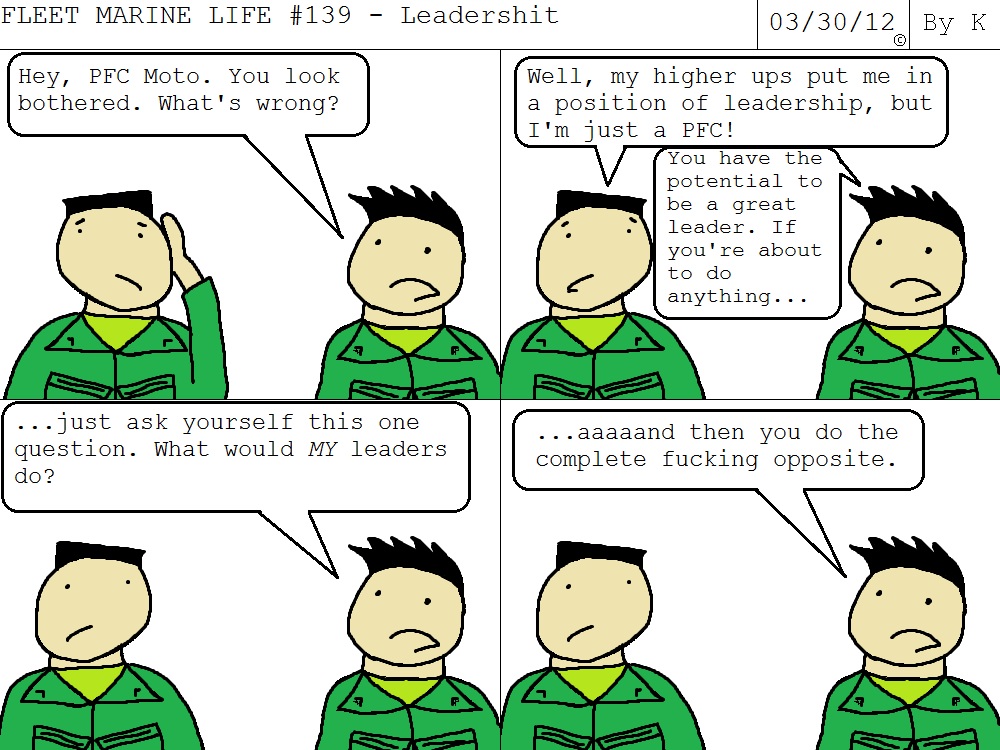Fleet Marine Life #139 – Leadershit
I’ve learned a lot about leadership in the Corps. Whenever you go, you’ll see “leaders” both good and bad. No matter what leaders you get, you’ll most definitely be able to take something out of it.
In my last unit, I met a lot of leaders who often set the example… of what not to do. The most important thing about leadership is being there. It’s half the battle! Most of the time, whenever the shit hits the fan, my leaders have no insight, no foresight or any type of sight at all. They have a tendency to disappear or put most (or all) of the pressure on the junior Marines to “figure it out.” This is not leadership at its finest.
Leaders are supposed to lead and be the top dogs, something to look forward to being. They’re not supposed to be leeches that latch on to their junior Marines and suck the life out of them. Junior Marines shouldn’t be used for personal gain, but they are. Leaders aren’t supposed to borrow money and CIF gear from their juniors and then never return them. Leaders aren’t supposed to reward their buddies and punish the hardworking. Leaders aren’t supposed to belittle junior Marines and call them racist slurs for fun.
There’s a lot of things leaders aren’t supposed to do. The damage they can cause is often times unforgettable and irreversible. Respect and trust will be lost, and those two values are very hard things to regain. Without either, a leader is worthless.
A lot of leaders I met in the Corps were pretty good to go, but it seems to me that the higher up you go in the ranks, the more corrupt and twisted you become. Most of the Sergeants and Staff NCOs I have met, sickened me. They were delusional beyond belief. Most of them led bitter lives as cheaters, thieves, liars, heavy alcoholics, and major league douchebags. Despite all these problems, they thought they had no problems.
They were so detached from their troops. Sure, a few of them had an “open door” policy, but it felt more like an “trap door” policy (Search integrity trap). The higher ups I knew were more concerned about burning Marines than actually listening to them and helping them.
Leaders in the Corps have a lot of power and impact on people’s lives. Unfortunately in the Corps, any suggestion or mere mention to any sort of positive change is often met with harsh criticism and backlash.
Lance Corporal Goodidea : Why do we have to wake up at 4am in the morning for PT? Can’t we do PT during our working hours since we don’t have too much work to do?
Sergeant Oldschool : No, we can’t do that.
Lance Corporal Goodidea : Why not?
Sergeant Oldschool : Because, we may have work during those times.
Lance Corporal Goodidea : 9 times out of 10, we usually don’t.
Sergeant Oldschool : Get out of my office.
The Marine Corps is very reluctant to change. They’re not the only ones. Many government bureaucracies are reluctant to change once certain policies are set.
Whenever Marines get MREs, they will field strip it and throw away most of the plastic and cardboard that they don’t have to carry. This helps reduce weight and size. After a few decades, we now have first-strike rations.
http://www.mreinfo.com/us/fsr/first-strike-ration.html
It’s like an MRE without all the extra packaging. Look at the difference in size between the old MREs and the new MREs. It cuts down on costs and waste. Of course, this idea is not something that a rocket scientist came up with. A lot of Marines would come up with the same question whenever they were field stripping their MREs. Why is there so much waste?
The USMC is a government bureaucracy whether you like it or not. Government bureaucracies is where innovation goes to die. There is little to no incentive to be outstanding. Status quo is where it’s at. It takes leaders from the top to help push about change. If the top leader is a status quo leader, then there will be no change. The USMC is jam-packed with status quo leaders.
Smelling the leadershit since 1775.

FSRs are amazing. They’re so much lighter, and they don’t taste half bad either (except I always thought the drink powder had a strange “piss” aftertaste). Now if they would just get more than 3 menus up and running they might have a good thing going.
I love me some zapplesauce…
L.O.L.s!